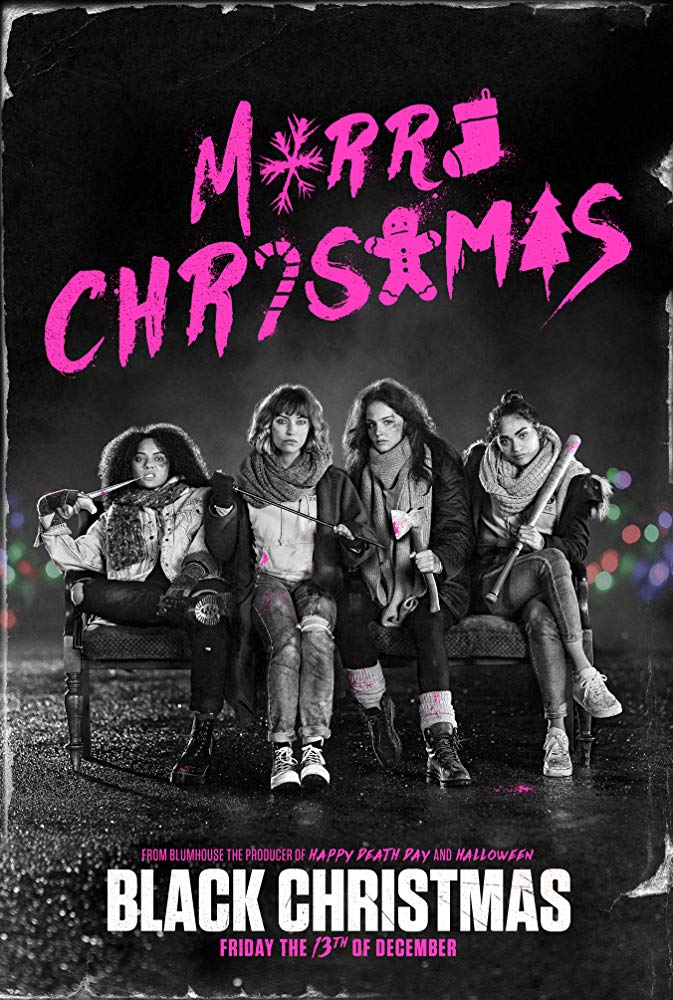Black Christmas
Bob Clark's 1974 Black Christmas remains a perfectly good slasher flick. A 2006 remake failed to capture its magic or bring much new to the table. The 2019 remake isn't really even a remake. Writer/director Sophia Takal and co-writer April Wolfe take the general premise, then spin it off into something very different. Honestly, they could have given it a complete other title, such little resemblance does it have to the original by the third act. What they've come up with is incredibly relevant to our times, making it a worthy horror movie, despite coming up a bit short on the scares.
The film centers around a group of sorority sisters staying at their college over Christmas break: Riley (Imogen Poots), Marty (Lily Donoghue), Kris (Aleyse Shannon), and Jesse (Brittany O'Grady). Riley was sexually assaulted by a former member of a fraternity. As revenge, the women perform a song during a talent show designed to call out the members of that frat for their misogynist behavior.
Immediately afterward, they all begin receiving threatening texts. Some of their sisters also begin turning up dead. Plenty of suspects are around. Could it be that creepy lit professor (Cary Elwes) who is upset over Kris's petition to get him fired for only teaching about white authors? Or the seemingly nice guy (Caleb Eberhardt) who's been shyly trying to romance Riley? Or Marty's boyfriend (Simon Mead)? It might even be the guy who assaulted Riley coming back to do it again. The answer is more complicated than that. To survive, our heroines need to band together to fight something unfathomably sinister – and masculine.
Black Christmas was fundamentally designed to be a #MeToo horror movie. In the last few years, our nation has had an important conversation about sexual assault, from Harvey Weinstein and Bill Cosby to Brett Kavanaugh and Donald Trump. Takal and Wolfe, working nicely in the long tradition of politically-themed horror, offer up a message to women in the audience: Shitty men have no claim to you, so fight them as hard as you can if they try to assert one. And for the dudes, there's an additional message: Don't be a shitty man. The passion with which Black Christmas not only displays empathy for sexual assault victims but also delivers its “enough's enough” theme is admirable.
A recent news story revealed that the filmmakers cut the picture from an R rating back to a PG-13 in order to make its messages available to teenagers who might need to hear them. I certainly can't fault that decision, although it does water down the parts intended to be scary. This is a movie with rapid, bloodless violence. Blood and gore, of course, do not make horror work on their own. That said, the story was clearly conceived to be about the atrocities bad men inflict upon women, so cutting away from the “kills” quickly diminishes the impact.
Purists, on the other hand, may object to the change of ending. Black Christmas adds a paranormal element not found in Clark's original. I wasn't particularly bothered by either of these flaws. The movie is well-acted, stylishly made, and in possession of an idea that it really wants to convey. What's great about horror is that it can be used to comment on society. Women have long been subjected to abuse in the genre, especially during the 1980s, when slasher flicks ruled the landscape. Black Christmas hands the power over to the ladies, and has the guts to shout its rage about abuse from the mountaintop.
This movie needs to exist right now, and I, for one, am extremely glad it does.
out of four
Black Christmas is rated PG-13 for violence, terror, thematic content involving sexual assault, language, sexual material and drinking. The running time is 1 hour and 32 minutes.
